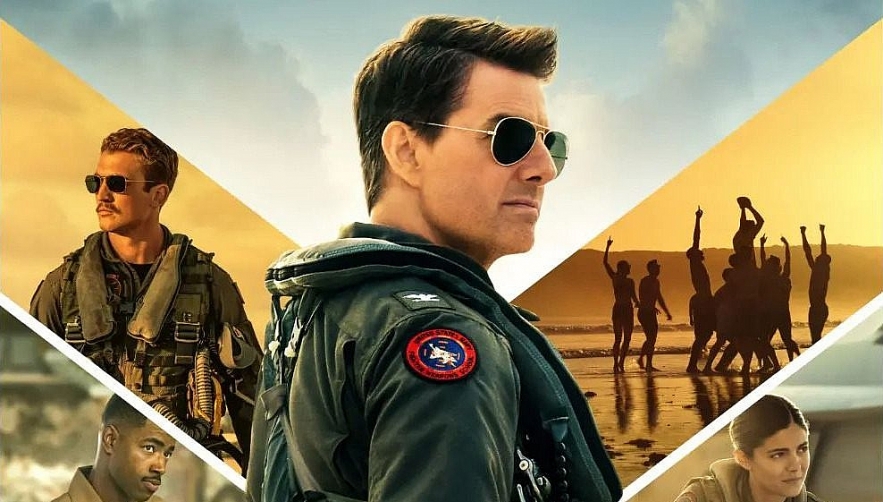Facts About The Secret Relationship Between Hollywood and Pentagon
 |
| Top Gun: Maverick: Secret Relationship Between Hollywood and Pentagon |
| Table of Content |
Pentagon Intervention in Hollywood?
Although the statement does not affect the script, the Pentagon can make suggestions about the latest weapons and equipment and suggest putting them on the screen. In every hit movie, it is not difficult to see the image of the US military. Even Marvel's superhero-themed sci-fi movies have collaborations with the US Department of Defense.
However, not all relationships are good. Cooperation between the Pentagon and Marvel took a turn for the worse when in The Avengers, the director depicted the US military launching a nuclear attack on New York. However, the relationship was mended with Captain Marvel, who was a pilot of the US military. The cooperation is so deep that the US Air Force opens a program to recruit women with the slogan: "Every hero has a story".
By one estimate, the US Department of Defense has collaborated on over 2,500 films over decades, and their involvement is not as transparent as claimed. In his 2004 book Operation Hollywood, journalist David Robb detailed how "the Pentagon has been telling filmmakers what to say - and what not to say, for decades".
Even many war movies, which are supposed to properly depict what happens on the battlefield through the experiences of soldiers, never receive the nod of the US Department of Defense. The seemingly simple principles of not adversely affecting the image of the US military make it difficult for many films to receive support.
For both the Pentagon and the movie producers, this partnership has done more for them than harm. However, for the public, part of the truth, such as war crimes, sex crimes, mental health problems, corruption... in the military will never be allowed to appear. in films supported by the US Department of Defense.
Handshakes are mutually beneficial
Hollywoo filmmakers can borrow expensive US Army kits for very cheap. The Pentagon is willing to lend hundreds of millions of dollars to film crews to create classic cinematic works. For them, movies are an extremely effective propaganda machine.
Last week, the movie "Top Gun: Maverick" by movie actor Tom Cruise officially hit theaters. Still images of breaking the rules, crossing the limit, still the image of a fighter gliding through the control tower making everything shake, then a bright smile and walking away as if it was still 1986 (five sets). movie Top Gun released).
However, like part 1, "Top Gun: Maverick" also strictly adheres to the rules of comprehensive cooperation with the US Department of Defense. Obviously, without the Pentagon, there would be no planes, bases, aircraft carriers and no Top Gun movie.
It's no secret that the U.S. Department of Defense readily and regularly cooperates with the entertainment industry, including lending its most expensive and cutting edge items. However, that partnership often comes at a cost, and it's not just about money.
The Pentagon strictly controls its image on the screen. Some argue that they are actually unnamed co-producers on thousands of films. Along with that, Hollywood became the propaganda machine of the US Department of Defense.
"Top Gun: Maverick" is no exception. Like the movie Top Gun, which was released nearly 40 years ago, this film also promotes the professionalism of the US military, with state-of-the-art equipment and professional operation.
Back in 1986, Top Gun became the highest-grossing film in America and also put the Navy in a halo. According to estimates, recruitment in the US Army increased by 500% that year.
The Pentagon has been working with Hollywood for nearly a century. Each force, from the Army, Navy, Air Force, Coast Guard... of the US has a liaison office in Los Angeles. At the Pentagon, there is also a separate office in charge of this matter.
Disclosure from insiders
Glen Roberts is the Department of Defense's director of Hollywood cooperation. He was 17 years old when the first Top Gun movie came out. In 25 years of service with the Air Force, Roberts, like most others, had never been in the cockpit of an F-14. However, the scripts that want to cooperate with the US Department of Defense must be approved by Roberts.
Roberts said his main mission is "to spread and protect the image of the US armed forces". Currently, they do about 130 entertainment projects each year, from movies to TV shows, video games, etc. "Manufacturers love us because we offer reliability and credibility. They also save significant costs," says Roberts.
However, Roberts himself also emphasized that there are conditions that filmmakers must adhere to. "We want to make sure that the products we support align with our core values. Potential partners must submit a full script for approval and must be willing to accept requests for changes. change," Roberts said.
In addition to standardizing information, Roberts denied that the US Department of Defense plans to build its image on film. "The filmmakers are the creators and we're not. Our job is to support them, not interfere with their scripts," Roberts said.
In Hollywood, there are also directors and producers who have built close relationships with the Pentagon. Top Gun producer Jerry Bruckheimer has collaborated with the US Department of Defense on many other films such as Black Hawk Down, Armageddon and Pearl Harbor. Michael Bay, a former Bruckheimer collaborator, went even further by incorporating cult images of the US military into non-military themed movies, such as Transformers.
Hollywood and Pentagon Advertising?
The US Department of Defense has just been criticized for manipulating Hollywood in the making of a movie about the US special forces raid and killing of Bin Laden in Pakistan. This is not the first time the Pentagon has received such criticism.
The movie titled "Zero Dark Thirty" directed by Kathryn Bigelow. Republicans argue that the Pentagon has opened the door too wide by providing some state secret information to the filmmakers. The move is intended to use Hollywood as a propaganda tool to promote an important feat during the first term of President Barack Obama.
Before the accusations, the Pentagon representative said that there was only a 45-minute meeting between the director, scriptwriter and a Defense Department official, with the purpose of "general introduction" about the series. film. Apart from this meeting, the film was not coordinated by any US Department of Defense.
From 1920 to the present, coordination between the Pentagon and filmmakers has been a regular thing. Film producers who want to keep costs down and want to increase the realism in movies with military images often ask for the support of the Department of Defense. Usually the support is just technical, but sometimes filmmakers are allowed to enter military installations or use tanks, planes or warships to serve the film.
Access to Defense Department equipment is not free, of course. Not free in terms of money, but also not free in terms of movie content, which means that the Pentagon always asks to see the movie script. A Pentagon official insists that it is only asking the filmmaker to show the script, and to see what support the filmmaker needs.
However, many filmmakers have said that, taking advantage of the right to see the script, the Ministry of Defense wants to enforce a film censorship policy. In the book "Operation Hollywood" by author David Robb, director Oliver Stone expressed bitterness when he lamented: "They see us as prostitutes, so they want to impose their views on us. ». This director was once denied support by the Pentagon to make a number of films about the Vietnam war.
| During its censorship, the Pentagon forced many filmmakers to change the content, turn villains into heroes, add details about the military participating in the rescue, cut out characters, and change the characters. change sensitive scenes. Screenplays will be required to be edited if the US Department of Defense considers its content inappropriate. The list of blockbusters that have been affected include Iron Man, Terminator Salvation, Transformers, King Kong and Superman: Man of Steel. ). To please Pentagon officials, some Hollywood producers had to adjust some details compared to the original, such as cutting characters, turning characters intended to be built in the direction of villains into heroes, change sensitive political settings, or add scenes of military rescues to your movies. But in return, they also have access to the locations, vehicles and military equipment needed to complete the film. |
 How to Fake Cry Immediately with Hollywood 'Tear Stick' How to Fake Cry Immediately with Hollywood 'Tear Stick' The social media has been flooded with accusations that Amber Heard is “fake crying”. How to cry immediately like Hollywood actors? |
 Top 10 Most Beautiful Young Hollywood Actresses in 2022/2023 Top 10 Most Beautiful Young Hollywood Actresses in 2022/2023 Hollywood has a number of actresses who get mesmerizing beauty and attain success at a very young age. |
 Top 5 Hottest Scenes In Hollywood Movies That Almost Deleted Top 5 Hottest Scenes In Hollywood Movies That Almost Deleted Check out our list of top 5 hottest scenes in Hollywood movies that were almost deleted! |























